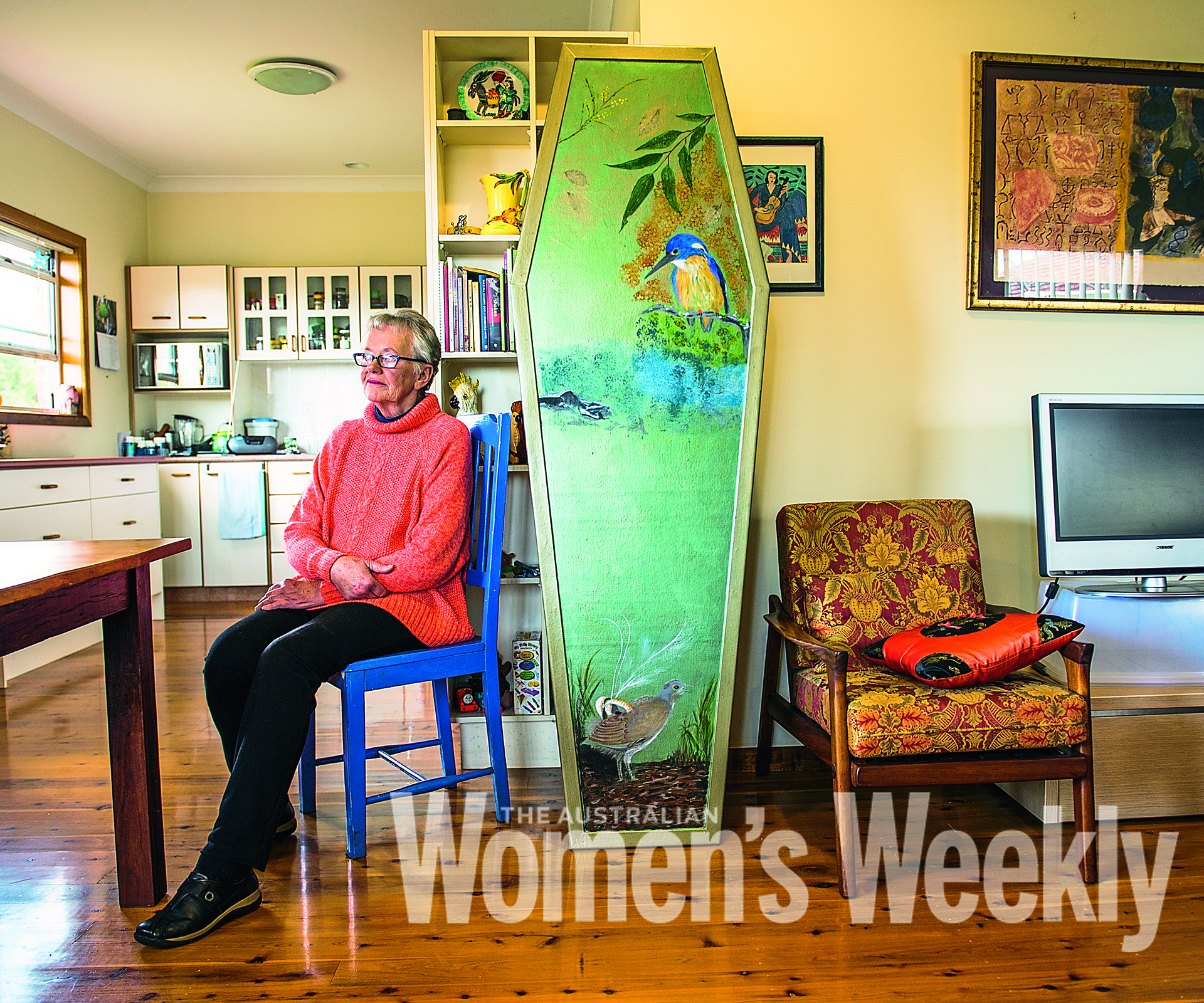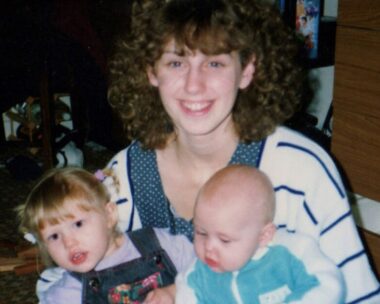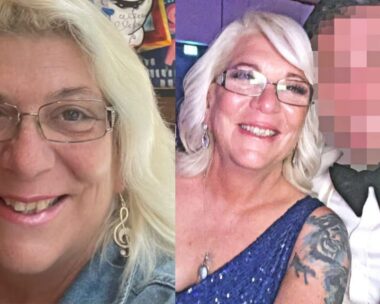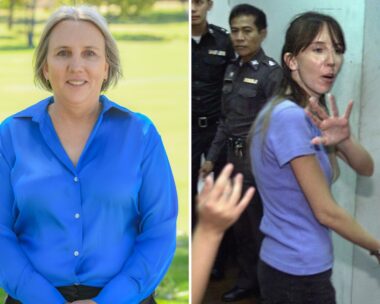At 73, Kate Worth has found a hobby that she will take to her grave – quite literally. Kate, a widowed retiree has already purchased her own coffin – indeed, during the past four years she has even personalized it with a delicately hand-painted kingfisher and lyrebird in preparation for the day of her funeral.
“When I tell people about my coffin, some people look at me like I’m mad,” says Kate, whose coffin is made of compressed cardboard, an eco-coffin that she bought on the internet for $13 that she keeps in the bedroom of her suburban home in Port Kembla, near Wollongong, on the NSW south coast.
“Some are horrified, as though I’m breaking some kind of a taboo. They simply don’t want to know, and they certainly don’t want to talk about it. However, others seem to understand what I am doing without my even having to explain it. They’re the ones who want to know where I got it and how they can get one, too.”
Kate is one of a growing number of Australians who want to take back some of the responsibility for the circumstances, meaning and rites that surround their own death. Though she isn’t ill, and expects many more useful and active years to stretch out in front of her, Kate is adding her own touches to what will happen when she, like all of us, confronts the final realities of death.
“We all have to go through it, if not today then perhaps tomorrow or the day after,” says Kate, laughing and hugging her coffin in her loungeroom. “You might as well put your two bob’s worth in while you can. I don’t like the idea of some person I don’t know putting me in a box I’ve never seen and sending off to some blast furnace. That’s not my idea of any good way to go.
“I have it all worked out. I want my family to paint their messages on the side of this coffin. I want them to see it as the centrepiece of the way I want to go out of the world.
“I call it my love box, because it’s going to have all the things I love on it: the birds, the bush, the colours of the morning, whatever my sons and daughters want to paint on it, whatever my grandchildren want to paint on it. I’m going out in style, but it’s going to be my style.”
And that’s where Jenny Briscoe-Hough steps in. Jenny is coordinator of Tender Funerals, a community-based, not-for-profit funeral service currently operating out of the Port Kembla Community Centre just a few kilometers from where Kate lives.
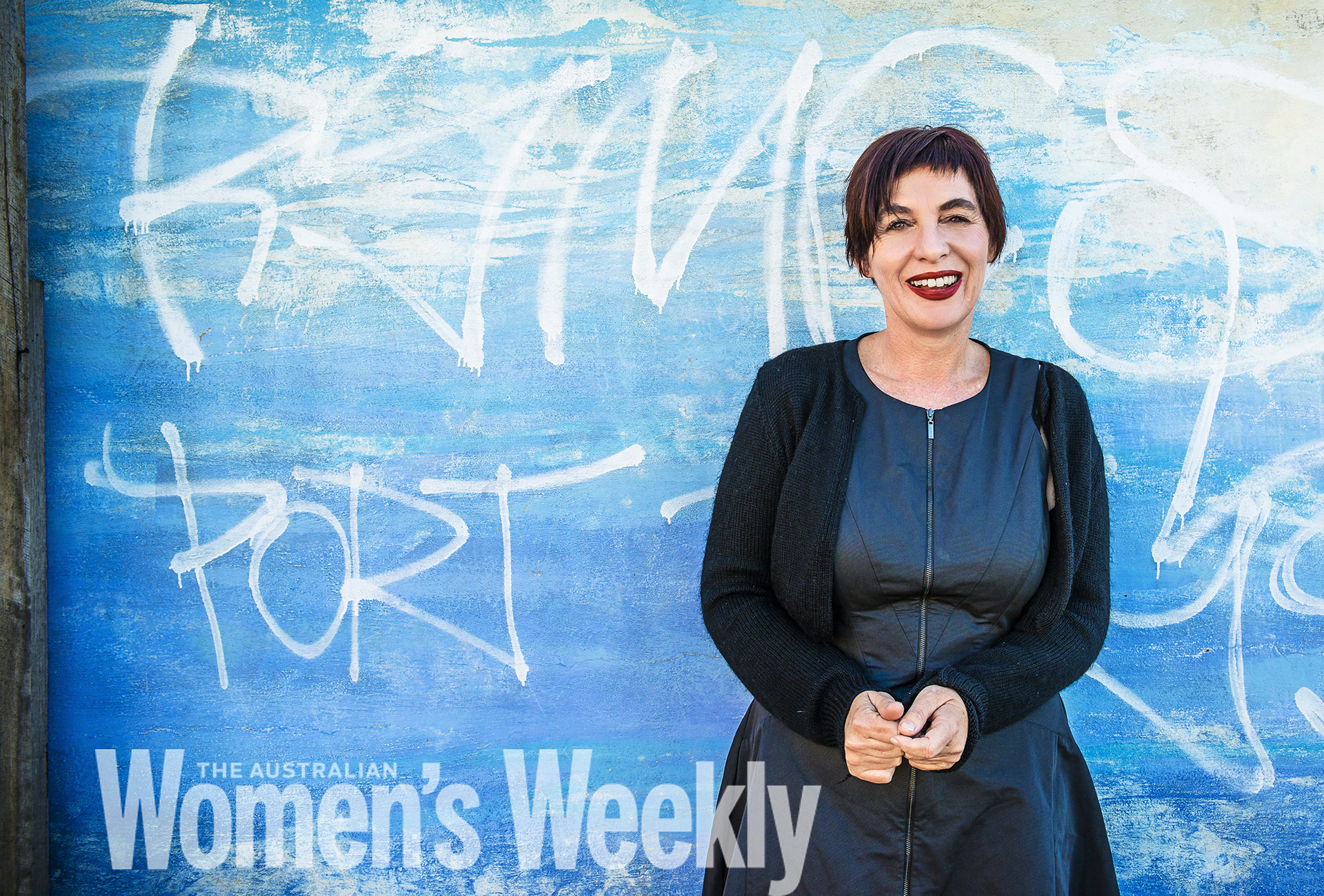
Jenny Briscoe-Hough’s inspiration came after the death of her mother six years ago. She wants funerals to be more about intimacy, not sales. PHOTO: Tim Bauer.
She, too, counts herself as part of that growing movement to claim back the intimacy and deeply personal experience that surrounds a loved one’s death.
“When we outsource everything from our food to walking our dogs, it’s all too easy to let someone else take charge of a funeral,” she says. “But in disconnecting from that experience and having someone else take responsibility for it we may actually be depriving ourselves and our families of the path to accepting death as a natural part of life.”
Jenny believes that Tender Funerals is just the beginning of a revolution that may one day challenge the expense and what she describes as the highly impersonal nature of a funeral industry sometimes more concerned with sales than sentiment.
There is a financial incentive, too. Even a basic funeral can cost as much as $10,000. Even those with regular incomes sometimes struggle with amounts, but in a low-income community such as
Port Kembla, the impact of such a large financial burden can be devastating.
“With a large Aboriginal population, a large migrant population and a large aging population life here for many is a struggle,” says Jenny, who came up with the idea after the death of her own mother six years ago. “An unexpected debt like $10,000 takes an enormous toll, not just financially but emotionally and psychologically and it can take years for people to recover, if at all.”
Tender Funerals hopes to provide funerals for around $1000. This, says Jenny, will allow people the opportunity to bury or cremate their loved ones with dignity and respect but without the fear and anxiety of incurring a huge debt.

Members of the Port Kembla Community Centre are pioneering a rethink about funeral services. PHOTO: Tim Bauer.
Just last year, Tender Funerals became the subject of a deeply moving documentary, Tender, by film maker Lynette Wallworth who recorded the beginnings of the project and the struggles of Jenny and her co-workers after learning that Nigel Slater, the 58-year-old caretaker at the community centre, had been diagnosed with terminal lung cancer.
“Nigel was like a father figure to many of the people who come to the centre,” says Jenny, 52, an arts graduate who formerly headed up both children’s charity Ronald McDonald House in Sydney and CANTEEN, an organization that tends to cancer-stricken children.
“He didn’t say much, but he was a gentle, nurturing soul who managed to win a place in our hearts. He took care of each of us in different ways. So when he got sick we were really determined to take care of him.”
His five-month journey from diagnosis to death is at the heart of both the film and the motivations of the community volunteers at the Tender Funerals project.
“Nigel was a great bloke,” says his friend Andrew Allard, 53, a retired steelworker and part of the Tender Funerals project. “We didn’t know that he was dying but we all guessed that’s what was going to happen. Nigel was a pensioner. He lived alone, disconnected from his family. He didn’t have any money. His friends were all here at the centre. It was almost as though the funeral project was meant for him.”
Although Nigel found it difficult to discuss what he wanted for his funeral with Jenny and his friends, he found he could talk to filmmaker Lynette Wallworth.
He told her he would like a natural burial. “He wanted to be buried and a tree planted on top of him,” says Lynette. “He was someone who loved nature and he wanted to be part of the soil.”
Lynettte says that Nigel’s illness and impending death brought the project workers together, much like a family, to have the conversations that we should all have with our loved ones while they are still healthy and capable of making decisions about their deaths and what happens at their funerals.
“We all have to deal with death,” says Lynette. “We should know our rights and responsibilities and educate ourselves,” Lynette says. “But we tend not to talk about it until it’s on us. And then, we’re often in such a state, either emotionally or physically, that we are unable to make any clear decisions at all. I think we need to make a cultural shift in our society around the way we deal and view death.”
In the end, Jenny and her team bowed to the wishes of Nigel’s family. He was cremated and interred in a local cemetery but not before his friends gave him an emotional farewell.
“When Jenny started to talk about washing and preparing bodies, I wasn’t sure if I would be able to do it,” recalls Misty Gurtala, 35, a clerical assistant at the community centre. “I have been to funerals before and looked after people who were dying but I never done that.”
Even so, she was able to overcome her natural fears. “We played some of Nigel’s favourite music – Bob Marley’s Three Little Birds – and then new all washed and dressed him for the service,” says Misty.
“I can’t quite explain it, but as we put our hands on him something passed between us, an intimacy, a kind of final act of love to someone we cared about. It was a beautiful experience. I have already told my mother that is what I want to do for her.”
Zenith Virago is a deathwalker. She counsels people with terminal illness about coming to terms with death. She also helps their families deal with all the preparation for a funeral.
“It’s really important that people have those conversations while they can,” says Zenith, 54, who runs counseling seminars across the country from her base in Byron Bay. “The music to be played at a funeral is a topic that often opens the door to whatever the person is feeling inside be that fear of death or pain or concern for those they leave behind.”
That kind of participation is a vital ingredient in the grieving process, says Zenith. “In the past, and in others cultures around the world, people washed and prepared the body as a rite of passage,” she says.
“The funeral industry has stepped in between our loved ones and us. They have made it neat and tidy but they have also separated us from our emotions. But in taking those feelings back, we can find a way to a better bereavement.”
‘We’re not saying that people in the funeral industry don’t have feelings,” says Jenny. “Many do. But there are better ways to do things. Many people find that they are part of a production line – you can have one song and five minutes with the body and then you have to move on because there’s another funeral.
“What we are saying is that if you take control then you can take back that time. We celebrate birth as the beginning of life but perhaps we should also be looking at death as the natural end of life, a natural progression.”
Jenny says many people are unaware that they can keep a body at home or even hold the funeral themselves. As part of their preparations, Tender Funerals has imported a body cooling plate from the Netherlands, which allows the bereaved to keep their loved ones’ bodies at home for a time, as many do in Europe.
They are also trying to raise $250,000 to allow them to buy what was once the local fire station to establish a mortuary, run by a full-time funeral director. “We don’t want to compete with the big funeral homes, but we want people to have a choice,” says Jenny.
Wollongong Lord Mayor Gordon Bradbery says what Tender Funerals is doing is reclaiming some of what we are as human beings.
“The project is about people wanting to take control of their lives and the way they grieve with their loved ones at the time of death,” he says.
“Death has become so sanitised, we’re so disassociated from it. We’re told how to think in life, what to wear, how to be born and how to die. If we put life into context then when I die, I’ll go back to the earth from which I came.”
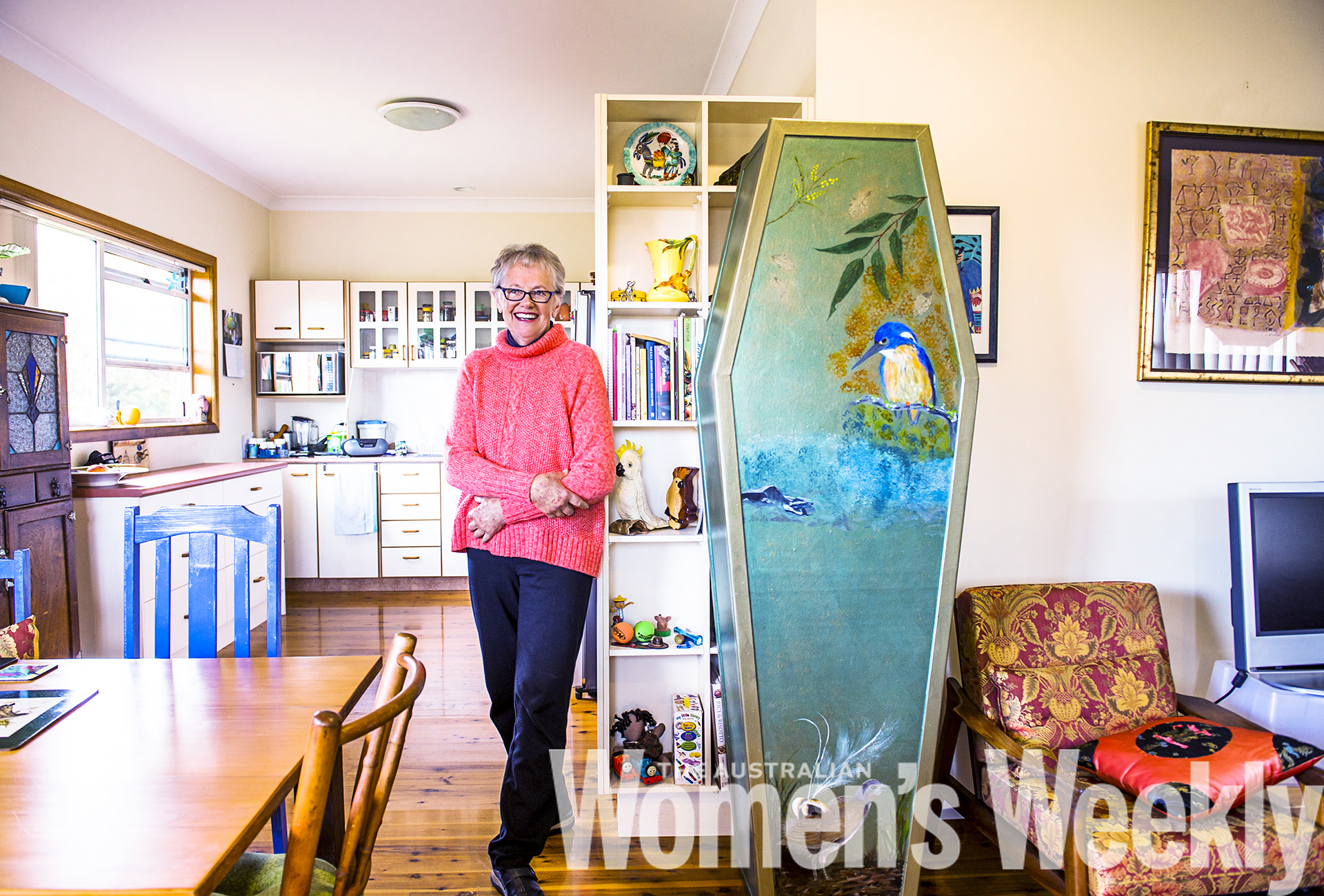
Kate Worth shows off her cardboard coffin, which she bought online for $130 and has transformed into her own style. PHOTO: Tim Bauer.
And that’s precisely how Kate Worth wishes to be buried. She views it as a partnership between her and the earth. “I want Jenny to help me and my family get ready for my funeral,” says Kate. “I want to be buried with a tree or a shrub on top of me. I want to know that I am helping to give life to something beautiful. ”
A version of this story first appeared in the July 2014 issue of The Australian Women’s Weekly.
